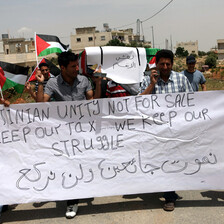The Electronic Intifada 3 May 2011
RAMALLAH, occupied West Bank (IPS) - Israel has lashed out at the recent ground-breaking deal in Cairo, which will see unification of the two main Palestinian political factions after four years of bitter infighting, by threatening economic sanctions against the Palestinians.
“We have agreed to form a government composed of independent figures that will start preparing for presidential and parliamentary elections,” chief Fatah negotiator Azzam al-Ahmad told the media in Cairo last week.
“Elections will be held in about eight months from now,” he said, adding the Arab League will oversee the implementation of the agreement.
Hamas’ deputy leader, Mousa Abu Marzouk, added, “Our rift gave the Israeli occupation a chance. Today we turn a new page.”
Mahmoud al-Zahar, a senior Hamas leader who participated in the talks, said the 27 April deal covered five points, including combining security forces and forming a government made up of “nationalist figures.” He said Hamas and Fatah would also free respective prisoners.
In addition, the parties reached an agreement regarding who would sit on the central elections committee, and on a 12-judge committee to oversee the elections. A joint Hamas-Fatah defense committee will oversee the Palestinian security forces. The caretaker government will be composed of technocrats without party affiliation, to be chosen jointly by both parties.
The Israeli government is using the unity agreement, which is due to be ratified in Cairo this week, as justification for punitive economic measures against the Palestinians.
Israeli Finance Minister Yuval Steinitz has refused to hand over approximately $88 million in customs taxes and other levies belonging to the Palestinians as stipulated in the 1993 Oslo Accords. Israel has further said it is also considering imposing economic sanctions.
More than 170,000 Palestinians who are employed by the Palestinian Authority in the occupied West Bank and Gaza could go without their salaries if the money is withheld, which would create chaos.
Appointed-PA Prime Minister Salam Fayyad told journalists that he and his officials had made urgent contacts with influential international figures asking them to pressure Israel to release the funds owed to the PA. Israel collects approximately $1.4 billion annually on behalf of the PA.
Fayyad added that the attempts at economic blackmail by Israel would not derail the unity process. “We are determined to see the reconciliation through despite this decision.”
Senior Fatah official Tawfiq Tirawi added, “If Israel thinks we have to choose between peace with it and peace with Hamas — any Palestinian you ask will tell you we prefer Palestinian unity over peace with Israel,” he said. He further pointed out that even with the Palestinian split there had been no peace talks with Israel.
Simultaneously, Israeli Prime Minister Benjamin Netanyahu lashed out at the attempt at reconciliation.
“The Palestinian Authority must choose either peace with Israel or peace with Hamas. There is no possibility for peace with both,” Netanyahu said in a televised statement.
The Israeli government said the unity accord, which took both Israeli and American intelligence by surprise, would not secure peace in the Middle East. Netanyahu further demanded that Abbas carry on shunning the Islamist movement, which has governed the Gaza Strip since 2007 after ousting Fatah in factional fighting.
Tirawi responded by saying that it was unnecessary for every faction of the Palestinian political entity to recognize Israel for peace to proceed.
He stated that several factions of the Palestine Liberation Organization had disagreed with the Oslo accords but had abided by the democratic majority in the PLO to recognize Israel.
“Additionally, we will welcome any peace with Israel, but it will have to stop settlement construction. It is Israel that prefers settlements over peace,” he said.
Palestinian unity is regarded as an essential step towards establishing a Palestinian state. Palestinians intend taking their case for independence to the UN General Assembly in September and expect to be recognized by 150 nations — well above the requisite number for statehood.
Netanyahu, meanwhile, has lost no time in trying to turn the unity decision against the Palestinians politically by appealing to the international community not to deal with the new unified Palestinian leadership.
He stated that Israel’s security was now under threat by the “terrorist” movement Hamas. Avigdor Lieberman, the Jewish state’s foreign minister, declared that Hamas would now take over the West Bank. Senior Israeli military intelligence figures, however, accused Netanyahu of exaggerating the security threat and trying to score political points.
Dr. Samir Awad from Birzeit University, near Ramallah, believes that there is no turning back and that eventually the international community will support a unified Palestinian political front.
“The Palestinians, the indigenous inhabitants, have received nothing from Israel in return for giving up the majority of their homeland and recognizing Israel.”
“They now have nothing to lose. The Egyptians have made a courageous decision to open the Rafah crossing into Gaza permanently, and national unity is an important step forward,” Awad told IPS.
All rights reserved, IPS — Inter Press Service (2011). Total or partial publication, retransmission or sale forbidden.




